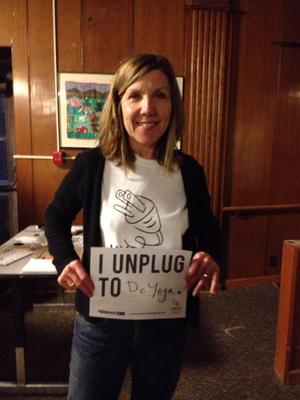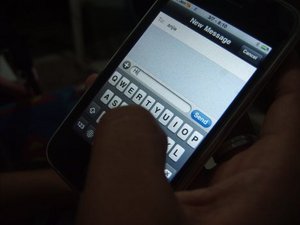How long could you go without your cell phone?
An hour? A day? A week?
Stop hyperventilating and consider: what would 24 hours without any electronic devices, including the screen you're using to read this article, look like?

EMU Christine Tracy pledged to 'unplug' March 1.
Facebook photo by Allie Tomason
An estimated 75 Eastern Michigan University students and staff have pledged to find out. They've promised to partake in the National Day of Unplugging, during which thousands of people —from Chicago to New York to Poland— unplug from sundown Friday until sundown Saturday.
During that 24-hour period, participants will disconnect from phones, computers, radio and television. For a day, they'll give up emailing, Facebook and Twitter.
"The primary purpose is to take a step away," says EMU media professor Christine Tracy, who encouraged her media ecology class to unplug for a day.
Tracy recalled a scene she encountered in Ann Arbor on a recent morning: "The sun had come out in the winter and I was feeling great from having done yoga, and I noted three people walking down the street, and two out of the three of them were on their cell phones as they were walking."
She continued:
"We're unconsciously using technologies in ways that are keeping us from living our lives fully."
Tracy had hoped for upward of 100 pledgees, but found that gathering support was harder than she anticipated.
In a recent study, the University of Michigan found that cell phone use is contagious. When studying young adults in 10 second intervals, researchers found that individuals used their cellphones during 24 percent of the intervals. If one young adult pulled out a cellphone, other young adults nearby were 39.5 percent more likely to reach for their own devices soon afterward.
Individuals in their 30s and 40s also like to stay connected. U-M researchers found that members of Generation X report engaging in an equal number of in-person and electronic conversations each month. In the course of a typical month, study participants reported sending an average of 39 non-work emails, using Facebook nearly 23 times, using Twitter four times, Skyping once, and sending digital pictures seven times.

Cell phones can be hard to put down for some users.
"[The goal is for participants] to step away from their technology for a brief amount of time so they can see what it feels like, and then when they go back to their technology hopefully [they'll have] a more concise appreciation and use," Tracy said.
In preparation for Friday, Tracy and members of her class held an unplugged event on Feb. 26 where students played acoustic music and games.
"People were together in a different kind of way," she said. "I think when we have our devices with us we think we're connected, but we're really not."
So, could you unplug for a day? If you did, what would you do with all your extra time?
Kellie Woodhouse covers higher education for AnnArbor.com. Reach her at kelliewoodhouse@annarbor.com or 734-623-4602 and follow her on twitter.